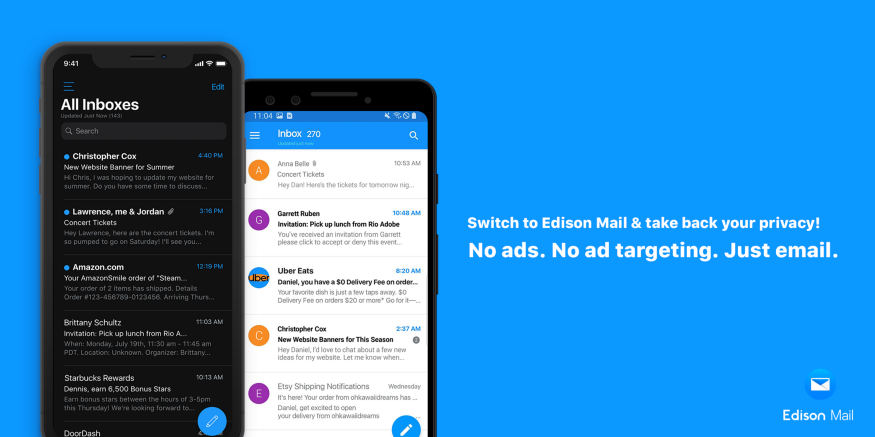Don’t Let Ads Invade Your Mailbox
While seen more as mild annoyances, email ads are even more invasive than targeted ads you see on social media
Ad-based business models are inherently anti-privacy as they need to gather personal information about you in order to correctly target you with ads.
Edison Mail offers a quality alternative for individuals searching for an email application without advertisements.
One of the truths of living on the internet is that no matter where you go, ads follow you. It’s become a bit of a running internet joke that if you ever discuss a product out loud, that an ad will soon follow. Despite all these jokes, and how often ads follow people online, there’s still a lot of confusion as to how they work. A study from the Pew Research Center, focused on Facebook algorithms and personal data, found that 74% of adult Facebook users didn’t know that Facebook maintained these lists. The study also found that 51% of respondents weren’t comfortable with Facebook compiling these lists about them.
The thing is, Facebook is anything but the outlier here. Companies whose business models are based on ads need to make your business their business. Many are unaware that social media sites like Facebook will maintain individual lists of users’ interests and traits (everything from political affiliation, racial affinity, etc) in order to target them for ads.
How it works is companies want to advertise to consumers, so they’ll go to Facebook (or another social media site) and tell them the specifics of the audience they want to reach. For an example, let’s say that upcoming makeup brand Flossier tells Facebook that they want to target women who are between the ages of 18–24 who live in Los Angeles and have an interest in makeup. Facebook then identifies the users they have who match those characteristics and show Flossier’s ads to these users. Depending on what type of ad campaign it is, Facebook will get paid based off of how many people see the ads, click on the ads, or interact with the ads in some other fashion. Because of that, they’re always fine tuning the list of information they have on users.
While we’ve used Facebook as an example, this is the truth for all ad-based business models. For these ads to work and be profitable, companies need to make sure that your business is their business, so if you age out of a group, move somewhere new, or change interests in some way or another — these companies need to know.
While social media companies are usually maligned as the worst offenders, there are plenty of others at fault in today’s free machine.
Email Ads — mildly annoying and wildly invasive
Unlike our mail app, other ad-based email apps are only free because the companies use your personal information to target you with ads. Just as Facebook does, these email companies will compile lists of information about you as an individual. While these email ads can come off more like mild annoyances rather than invasions of privacy, there’s not much that separates them from the ads you encounter on social media.
To understand the degree to which email ads can target you as an individual, all you have to do is look up how to make one yourself. While many of the targeting tools are the elements you’re used to seeing and aren’t unusual for an email provider to know about their users (age, location, etc.) there are targeting elements that cross the line from expected to invasive.
In an invasive example, one prominent email company offers the ability to target people’s inboxes in the midst of big life events — reaching email users in times of transition such as “moving, marriage, or college graduation.” Now you may be wondering how an email provider would know that information well enough to let their advertisers know of it. The thing is, these large ad-based email companies use more than your email account information to profile you. They follow you online through the offering of other free services. These services continue to gather intel on you in order to create a full profile of who you are. Without you realizing it, your online identity is being formed and analyzed by hundreds, even thousands of advertisers. They follow you from corner to corner of the internet. Then, armed with full knowledge of who you are — including your likes, dislikes, and what phase of life you’re currently in — these ads find themselves targeting you in your email.
The other issue with email ads is that they’re made to hide in plain sight. They’re designed to be not much different from the emails you receive on a day to day basis, and in doing so, they almost seem more insidious. While they’re legally obligated to note that they’re an ad, there’s not much else different about them. They’re designed to look like an unread email at the top of your screen, so you feel the urge to click on them and mark them as read. It’s an action that people are all too familiar with, clicking on an ad offhand or without thinking about it or as a general reflex.
However, once you do that — no matter how accidental it was — you’ve triggered a series of events. Once you interact with an ad, the company can now continue to target you all over the internet. You’re now on another list that you didn’t know about, being followed around the internet by yet another company looking to find more personal details about you.
Differentiation in the free model
Edison Mail works to ensure that free doesn’t mean users are analyzed and targeted by advertisers. Our research backed business model is designed so that you, the individual consumer, know that you’re not on one list or another with a bevy of details about yourself. Edison Mail doesn’t know these specifics about you — whether or not you’re about to graduate, get married, or move — because it doesn’t matter to our business model. Our customers don’t care about these details, and neither do we, so we aren’t combing for ways to find your personal information in order to survive.
Edison Mail’s focus on privacy ensures that our research participants remain anonymous. Our research is de-identified and provided for our customers and readers in an aggregate form so our users never have to worry about their personal data, and all our research is statistically valid and normalized against the U.S. Census so our customers know they’re receiving the best research possible. The way we look at it, it’s a win-win.
Ultimately, what we here at Edison Mail are hoping to offer is choice in the world of free. Some users are okay with ads in their inboxes, others aren’t. Some people are willing to pay to avoid both ads and research. Other people are okay with a free app that runs on research. That last choice is the option we provide — a free tool without loss of personal privacy.
Download the Edison Mail App Today
Learn more about how you can use Edison Mail for iOS, Mac, and Android to their fullest potential. Reduce spam, and access your favorite email services like Gmail, Yahoo, Microsoft Exchange, Comcast, and more in a clean unified inbox.







